 September
2018 –
NINDS awards SBIR Phase 1 Grant entitled “Mimicking synuclein toxicity in plant cells to identify novel neuroprotective leads". The background of
this SBIR Phase 1 is that several human neurodegenerative diseases, including familial Parkinson's disease, share a mechanism in which the enzymatic modification and subsequent aggregation of a nerve cell protein called alpha-synuclein kills nerve cells. Plant root cells contain a similar enzyme, but they do not contain alpha-synuclein. By creating plant cells expressing human alpha-synuclein the applicants will be able to seek novel plant metabolites that inhibit this neurotoxic process and that will lead to novel drugs to treat these devastating neurodegenerative diseases. September
2018 –
NINDS awards SBIR Phase 1 Grant entitled “Mimicking synuclein toxicity in plant cells to identify novel neuroprotective leads". The background of
this SBIR Phase 1 is that several human neurodegenerative diseases, including familial Parkinson's disease, share a mechanism in which the enzymatic modification and subsequent aggregation of a nerve cell protein called alpha-synuclein kills nerve cells. Plant root cells contain a similar enzyme, but they do not contain alpha-synuclein. By creating plant cells expressing human alpha-synuclein the applicants will be able to seek novel plant metabolites that inhibit this neurotoxic process and that will lead to novel drugs to treat these devastating neurodegenerative diseases.
 August
2017 –
NIAAA awards SBIR Phase 1 Cooperative Agreement Grant entitled “Development
of JR-220 (4-Chlorobenzylidenamino-guanidine hydrochloride) as a
medication for alcohol dependence". The background of
this SBIR Phase 1 is that dependence on alcohol is a very serious
problem in the US with a huge medical and financial burden. Current
treatments are unsatisfactory and new medications are required.
Naprogenix is developing a new drug, synthesized at the University
of Kentucky that has shown great promise in preclinical development,
and this proposal is to obtain the data necessary before
investigation of the drug in the human. August
2017 –
NIAAA awards SBIR Phase 1 Cooperative Agreement Grant entitled “Development
of JR-220 (4-Chlorobenzylidenamino-guanidine hydrochloride) as a
medication for alcohol dependence". The background of
this SBIR Phase 1 is that dependence on alcohol is a very serious
problem in the US with a huge medical and financial burden. Current
treatments are unsatisfactory and new medications are required.
Naprogenix is developing a new drug, synthesized at the University
of Kentucky that has shown great promise in preclinical development,
and this proposal is to obtain the data necessary before
investigation of the drug in the human.
 March
2017 –
NCCIH awards SBIR Phase 2 Grant
entitled “Harvesting specific plant metabolites from hairy root cultures using magnetized nanoparticles".
The background of this SBIR Phase 2 is that drugs can be produced in
plant cell cultures as an alternative to extracting them
from intact plants. This has some advantages, but a major
disadvantage is that "harvesting" the drugs requires the
destruction of the slow growing and expensive plant cell
cultures. This phase II proposal is to further develop a
continuous harvesting system in which nanoparticles can be
used to extract drugs from plant cells without damaging the
cells. March
2017 –
NCCIH awards SBIR Phase 2 Grant
entitled “Harvesting specific plant metabolites from hairy root cultures using magnetized nanoparticles".
The background of this SBIR Phase 2 is that drugs can be produced in
plant cell cultures as an alternative to extracting them
from intact plants. This has some advantages, but a major
disadvantage is that "harvesting" the drugs requires the
destruction of the slow growing and expensive plant cell
cultures. This phase II proposal is to further develop a
continuous harvesting system in which nanoparticles can be
used to extract drugs from plant cells without damaging the
cells.
 September
2016 – NIAAA
awards SBIR Direct Phase 2 Grant
entitled “Mutant transgenic plant cells as a novel source of
drugs". Background: Naprogenix is
developing a technology which enables us to "tell" mutant cells of a
plant species what kind of drug we want them to make. This proposal
applies the technology to drugs that may be of value in Parkinson's
Disease or drug dependence. The main objective is to show that the
technology works, so that it can be adopted by the industry as an
alternative to chemical synthesis as a source of new drugs.
The objective is further development of a biotechnology that
"evolves" biosynthesis in a plant species toward bioactive
metabolites with a specific molecular target. September
2016 – NIAAA
awards SBIR Direct Phase 2 Grant
entitled “Mutant transgenic plant cells as a novel source of
drugs". Background: Naprogenix is
developing a technology which enables us to "tell" mutant cells of a
plant species what kind of drug we want them to make. This proposal
applies the technology to drugs that may be of value in Parkinson's
Disease or drug dependence. The main objective is to show that the
technology works, so that it can be adopted by the industry as an
alternative to chemical synthesis as a source of new drugs.
The objective is further development of a biotechnology that
"evolves" biosynthesis in a plant species toward bioactive
metabolites with a specific molecular target.
 September
2014 – Naprogenix has been awarded from NIAAA SBIR Phase
1 Grant
entitled “Novel flavonoids as anti-inflammatory agents in
alcoholism”.
Background: Alcoholism (either dependence or abuse) affects more than 8% of
the population of the US, and the societal costs approach $200BN
annually. About half of this sum is medical cost, much of which is
accrued in treating alcohol-related organ damage. This organ damage
is commonly associated with cellular inflammation, and this is also
a major contributing factor to alcohol-induced neurodegeneration,
which may rival Alzheimer's dementia in its prevalence in the US.
Despite this, there are currently no accepted approaches to
preventing or reversing this tissue damage. This project
proposes a novel approach to organ and brain damage which has major
implications for pharmacotherapy of, and/or nutritional intervention
in, these therapeutic targets. September
2014 – Naprogenix has been awarded from NIAAA SBIR Phase
1 Grant
entitled “Novel flavonoids as anti-inflammatory agents in
alcoholism”.
Background: Alcoholism (either dependence or abuse) affects more than 8% of
the population of the US, and the societal costs approach $200BN
annually. About half of this sum is medical cost, much of which is
accrued in treating alcohol-related organ damage. This organ damage
is commonly associated with cellular inflammation, and this is also
a major contributing factor to alcohol-induced neurodegeneration,
which may rival Alzheimer's dementia in its prevalence in the US.
Despite this, there are currently no accepted approaches to
preventing or reversing this tissue damage. This project
proposes a novel approach to organ and brain damage which has major
implications for pharmacotherapy of, and/or nutritional intervention
in, these therapeutic targets.
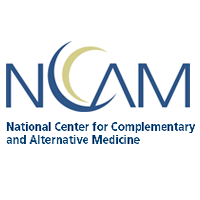 May 2014 –
NCCAM awards Naprogenix a
STTR Phase 1 Grant entitled “Harvesting specific plant metabolites
from hairy root cultures using magnetized nanoparticles”. The
overview of phase I of the STTR Grant is that many valuable plant compounds can be produced in
tissue culture, but their isolation requires destruction of the plant tissue
before chemically separating the required compounds from others. This
project aims to develop magnetized nanoparticle devices that can be used to
remove specific types of compounds from living plant tissue. This is
predicted to greatly increase the efficiency of producing medicines or
nutrients in plant tissue culture. These devices will also increase the
commercial value of the proprietary biotechnology used by the applicant
company, which is designed to optimize plant cell cultures for their ability
to produce specific natural products. May 2014 –
NCCAM awards Naprogenix a
STTR Phase 1 Grant entitled “Harvesting specific plant metabolites
from hairy root cultures using magnetized nanoparticles”. The
overview of phase I of the STTR Grant is that many valuable plant compounds can be produced in
tissue culture, but their isolation requires destruction of the plant tissue
before chemically separating the required compounds from others. This
project aims to develop magnetized nanoparticle devices that can be used to
remove specific types of compounds from living plant tissue. This is
predicted to greatly increase the efficiency of producing medicines or
nutrients in plant tissue culture. These devices will also increase the
commercial value of the proprietary biotechnology used by the applicant
company, which is designed to optimize plant cell cultures for their ability
to produce specific natural products.
 September
2013 – Naprogenix has been awarded from NIAAA SBIR Phase 2 Grant
entitled “Selection-driven plant metabolites for treatment
of CNS diseases”. September
2013 – Naprogenix has been awarded from NIAAA SBIR Phase 2 Grant
entitled “Selection-driven plant metabolites for treatment
of CNS diseases”.
Project Background: Plants are a major source of existing medicines,
but the pharmaceutical industry has now almost abandoned this source
in favor
of synthetic chemicals. One reason is that plant metabolites are often
too complex for synthetic methods to be used for their modification or
production. The technology being developed by Naprogenix uses the plants
own biosynthetic capacity to modify the active chemicals contained in the
plant. It is also capable of increasing the amounts of the active chemicals
that are present. The “directed evolution” of a plant species
using this technology is capable of generating novel compounds that may
be of value in many CNS diseases, for example the targets in this project
are important in drug dependence and neurodegenerative disease.
July 2013 – Naprogenix has received a KY Matching Funds Award
entitled “Accelerated implementation of Commercialization Plan
for Novel Pharmacotherapies for Alcoholism”. This proposal is to
extend the research to improve the potential value of the products in
alcoholism.
March 2013 – NIAAA awards Naprogenix a SBIR Phase 2 Contract entitled “Novel
Pharmacotherapies for Alcoholism”. The objective of phase II of
the SBIR Contract is to evaluate four lead compounds as treatments for
alcoholism.
January 2013 – Terry
Minton becomes the full-time CEO of Solidagex and Dr. John Littleton
assumes the role as CEO of Naprogenix.
September 2012 -
NIAAA awards Naprogenix a SBIR Phase 1 Contract entitled “Novel
Pharmacotherapies for Alcoholism”. The project aims to discover
new drug or nutritional approaches to the treatment of alcoholism. This
condition is common and devastating, with relatively ineffective current
treatment. The project therefore has the potential for great therapeutic
and commercial application.
 June 2011 – Naprogenix announces the spin off of Solidagex, a
new company to commercialize to promote native goldenrod-based products.
Research & Development performed by Naprogenix on its native plant
extract library identified a native goldenrod species as containing novel
valuable activity in flavonoid-rich extracts from this species. Terry
Minton will become the CEO of Solidagex. Solidagex will be raising private
capital to begin commercial operation to produce goldenrod extract for
incorporation into existing and new products through contracts in pet
food, cosmetic, and nutraceutical companies in the market.. Naprogenix
intends to follow a similar commercialization plan for other products
that are identified in wild type plant extracts in its library. June 2011 – Naprogenix announces the spin off of Solidagex, a
new company to commercialize to promote native goldenrod-based products.
Research & Development performed by Naprogenix on its native plant
extract library identified a native goldenrod species as containing novel
valuable activity in flavonoid-rich extracts from this species. Terry
Minton will become the CEO of Solidagex. Solidagex will be raising private
capital to begin commercial operation to produce goldenrod extract for
incorporation into existing and new products through contracts in pet
food, cosmetic, and nutraceutical companies in the market.. Naprogenix
intends to follow a similar commercialization plan for other products
that are identified in wild type plant extracts in its library.
Naprogenix, Inc. is a research and development company focused on identifying
valuable bioactivity in native plants to produce extracts or chemical
compounds of commercial interest.
Website: www.naprogenix.com
Solidagex, Inc. produces natural extracts from Kentucky's native goldenrod
plant for use as bioactive ingredients in the nutrition, cosmetics and
Ag-bio industries. Solidagex offers customers the opportunity to derive
multiple benefits from one source of proprietary ingredients.
Website: www.solidagex.com
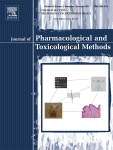 April 2011 – Naprogenix researchers’ findings entitled “Natural
Products Genomics: A Novel Approach for the Discovery of Anti-Cancer
Therapeutics” are published in Journal of Pharmacological and Toxicological
Methods April 2011 – Naprogenix researchers’ findings entitled “Natural
Products Genomics: A Novel Approach for the Discovery of Anti-Cancer
Therapeutics” are published in Journal of Pharmacological and Toxicological
Methods
Article title: Natural Products Genomics: A Novel Approach for the Discovery
of Anti-Cancer Therapeutics
Authors: N.R. Monks, B. Li, S. Gunjan, D.T. Rogers M. Kulshresthaa, D.L.
Falcone, and J.M. Littleton
Reference: JPM5987
Journal title: Journal of Pharmacological and Toxicological Methods
Website: http://www.sciencedirect.com/science/article/pii/S1056871911002371
September
2010 -
Minton Named Naprogenix CEO - Naprogenix,
Inc., a drug discovery and plant biotechnology company based
on University of Kentucky and proprietary intellectual property,
announced
today that it has appointed Terry Minton to be its CEO, effective immediately.
Minton, a Louisville resident with a wealth of experience in the healthcare
and biotechnology industries, is best known for his having launched the
cancer therapeutics company Aptamera with Dr. Donald M. Miller, Director
of the James Graham Brown Cancer Center. Amidst the economic disruption
wrought by the events of September 11, 2001, Minton raised several million
dollars in angel and venture funding and positioned the company for its
acquisition by the British pharmaceutical company Antisoma PLC.
Minton has held CEO and other leadership positions with various companies
in the healthcare technology and biotechnology sector. Additionally,
he spearheaded the development of high-value intellectual properties
at the Innovation Center for a Kentucky-based Fortune 100 health benefits
provider.
“Terry Minton is the perfect fit to lead Naprogenix – an
experienced biotech CEO who has raised millions in equity capital and
formed alliances with global companies capable of taking products created
by the Naprogenix technology platform into worldwide distribution,” said
John M. Littleton, M.D., PhD., Chief Scientific Officer and Co-Founder
of Naprogenix.
“Not only does Terry Minton understand this space, he has a consistent
track record of delivering in fundraising, product development and intellectual
property licensing and other monetization activities,” added Littleton,
who had been serving as interim CEO until a nationwide search for a replacement
led Naprogenix to Minton.
Naprogenix is the recipient
of National Institutes
of Health (NIH) Small Business Innovation Research (SBIR) and Small Business
Technology Transfer Research (STTR) funding, as well as support from
the Kentucky Science and Technology Corporation, and is the exclusive
licensee of patented technology owned by the University of Kentucky Research
Foundation, Inc.
Naprogenix’s
technology harnesses the power of plant metabolism by subjecting native
and engineered
plant extracts to high-throughput
pharmacological screening to discover novel, patentable structures and
activities useful for the treatment of neurodegenerative diseases, cancer,
age-related macular degeneration, and other chronic diseases. Certain
of the natural products are also useful as all-natural pesticides.
Minton will serve as President/CEO and Chairman of the Board of Directors
of Naprogenix and is expected to focus initial efforts on accelerating
product development along with consummation of strategic alliances with
global healthcare, nutritional and personal care products companies.
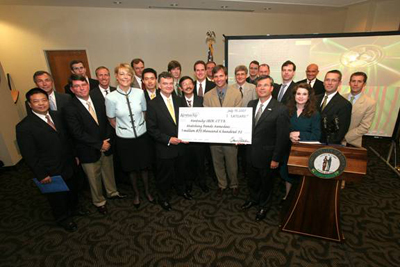 July
2007 - KY SBIR/STTR Matching Funds Press Release July
2007 - KY SBIR/STTR Matching Funds Press Release
Naprogenix was one of twenty companies that were recipients
of KY SBIR/STTR Matching Funds. In honor of these twenty companies,
Kentucky’s Governor Ernie Fletcher and Commissioner for
Department of Commercialization and Innovation Deborah Clayton
ceremoniously awarded $1.875 million dollar check to all the
representatives of the funded companies. Naprogenix received
KY matching funds for our National Cancer Institute Phase I STTR
on Novel estrogen receptor ligands from plant genomic.
Both the Louisville Courier Journal and Lexington Herald Leader
newspapers recognized Naprogenix as one of the awardees of this
funding from the KY State Government.
July 2007 - National Institute
on Alcohol Abuse and Alcoholism (NIAAA) awarded Fast-Track STTR Grant
on “Hypericum
extracts as potential anti-relapse medications in alcoholism”
June
2007 - National Institute on Alcohol Abuse and Alcoholism
(NIAAA) awarded Phase II STTR Grant on “Transgenic
plant cells as a source of hepatoprotective drugs”
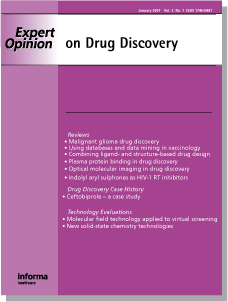 May
2007 -
John M. Littleton, MD, PhD (Chief Biomedical Science Officer) published
an article
titled “The future of plant drug discovery”in
Expert Opinion on Drug Discovery, May 2007, Vol. 2, No. 5, Pages
673-683. Please visit Expert Opinion Website at May
2007 -
John M. Littleton, MD, PhD (Chief Biomedical Science Officer) published
an article
titled “The future of plant drug discovery”in
Expert Opinion on Drug Discovery, May 2007, Vol. 2, No. 5, Pages
673-683. Please visit Expert Opinion Website at
http://www.expertopin.com/toc/edc/2/5 to
obtain copies of Dr. Littleton’s article.
May 2007 – Deane L. Falcone, PhD (Chief Molecular Science) represented Naprogenix at BIO 2007 conference in Boston, MA. Dr. Falcone presented a poster on “A novel integrated strategy for plant drug discovery based on high throughput pharmacological screening (HTPS) and plant genomics”
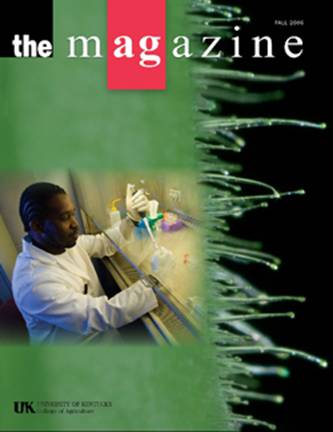
January 2007 – Lexington Venture
Club recognizes Naprogenix as one of the regional, early-stage companies
that received funding in 2006.
Fall 2006 – Naprogenix was featured in the University of Kentucky College of Agriculture “the Magazine” article titled “Biotechnology – Moving Beyond the Lab”.
August 2006 -
National Cancer Institute (NCI) awarded Phase I STTR Grant on “Novel
estrogen receptor ligands from plant genomics”
January 2006 – Dr. Deane Falcone and Dr. John Littleton were awarded United States Patent 6,989,236 titled “Methods to identify plant metabolites”.
January 2006 – Kentucky Science & Technology Corporation awarded R&D Voucher on “Novel
Active Insecticidal Compounds from Kentucky Native Plants”
Spring 2006 – The Lane Report’s Magazine featured Naprogenix in their annual “Research Kentucky”report.
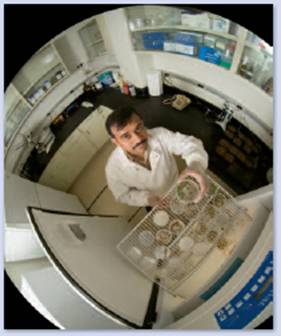 Spring 2006 – Kentucky AgriTechnology Magazine featured Naprogenix in the article titled “Natural Products Research = New Crops for Kentucky Farms” Spring 2006 – Kentucky AgriTechnology Magazine featured Naprogenix in the article titled “Natural Products Research = New Crops for Kentucky Farms”
January 2005 – Kentucky Science & Technology Corporation awarded R&D Voucher on “Application
of NPG Technology to Alternate Plant Species”
September 2004 – National Institute on Alcohol Abuse and Alcoholism (NIAAA) awarded Phase I STTR Grant on “Potential
anti-relapse drugs: a plant genomics approach”
June 2004 – National Institute on Alcohol Abuse and Alcoholism (NIAAA) awarded Phase I STTR Grant on “Application
of plant genomics to alcoholic brain damage”
September 2003 – National Institute on Alcohol Abuse and Alcoholism (NIAAA) awarded Phase I STTR Grant on “Transgenic
plant cells as a source of hepatoprotective drugs”
2003 –Naprogenix
obtains the exclusive license agreement with the University of Kentucky
on patented NPG technology. |